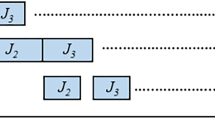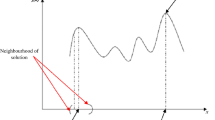Abstract
This paper studies a combinatorial optimization problem which is obtained by combining the flow shop scheduling problem and the shortest path problem. The objective of the obtained problem is to select a subset of jobs that constitutes a feasible solution to the shortest path problem, and to execute the selected jobs on the flow shop machines to minimize the makespan. We argue that this problem is NP-hard even if the number of machines is two, and is NP-hard in the strong sense for the general case. We propose an intuitive approximation algorithm for the case where the number of machines is an input, and an improved approximation algorithm for fixed number of machines.






Similar content being viewed by others
References
Ahuja RK, Magnanti TL, Orlin JB (1993) Network flows: theory, algorithms, and applications. Prentice Hall, Englewood Cliffs
Aissi H, Bazgan C, Vanderpooten D (2006) Approximating min–max (regret) versions of some polynomial problems. In: Chen D, Pardolos PM (eds) COCOON 2006, LNCS, vol 4112. Springer, Heidelberg, pp 428–438
Batagelj V, Brandenburg FJ, Mendez P, Sen A (2000) The generalized shortest path problem. CiteSeer Archives.
Bodlaender HL, Jansen K, Woeginger GJ (1994) Scheduling with incompatible jobs. Disc Appl Math 55:219–232
Chen B, Glass CA, Potts CN, Strusevich VA (1996) A new heuristic for three-machine flow shop scheduling. Oper Res 44:891–898
Conway RW, Maxwell W, Miller L (1967) Theory of scheduling. Addison-Wesley, Reading
Dijkstra EW (1959) A note on two problems in connexion with graphs. Numer Math 1:269–271
Garey MR, Johnson DS, Sethi R (1976) The complexity of flowshop and jobshop scheduling. Math Oper Res 1:117–129
Garey MR, Johnson DS (1979) Computers and intractability: a guide to the theory of NP-completeness. Freeman, San Francisco
Gonzalez T, Sahni S (1978) Flowshop and jobshop schedules: complexity and approximation. Oper Res 26:36–52
Hall LA (1998) Approximability of flow shop scheduling. Math Program 82:175–190
Johnson SM (1954) Optimal two- and three-stage production schedules with setup times included. Nav Res Logist Q 1:61–68
Kouvelis P, Yu G (1997) Robust discrete optimization and its applications. Kluwer, Boston
Monma CL, Rinnooy Kan AHG (1983) A concise survey of eciently solvable special cases of the permutation flow-shop problem. RAIRO Rech Oper 17:105–119
Röck H, Schmidt G (1982) Machine aggregation heuristics in shop scheduling. Method Oper Res 45:303–314
Wang Z, Cui Z (2012) Combination of parallel machine scheduling and vertex cover. Theor Comput Sci 460:10–15
Wang Z, Hong W, He D (2013) Combination of parallel machine scheduling and covering problem. Working paper, Tsinghua University
Warburton A (1987) Approximation of pareto optima in multiple-objective, shortest-path problems. Oper Res 35:70–79
Acknowledgments
This study has been supported by the Bilateral Scientific Cooperation Project BIL10/10 between Tsinghua University and KU Leuven, and Wang’s research work has been supported by NSFC No. 11371216.
Author information
Authors and Affiliations
Corresponding author
Additional information
A preliminary version of this paper has appeared in the Proceedings of 19th Annual International Computing and Combinatorics Conference (COCOON’13), LNCS, vol. 7936, pp. 680–687.
Rights and permissions
About this article
Cite this article
Nip, K., Wang, Z., Talla Nobibon, F. et al. A combination of flow shop scheduling and the shortest path problem. J Comb Optim 29, 36–52 (2015). https://doi.org/10.1007/s10878-013-9670-4
Published:
Issue Date:
DOI: https://doi.org/10.1007/s10878-013-9670-4




